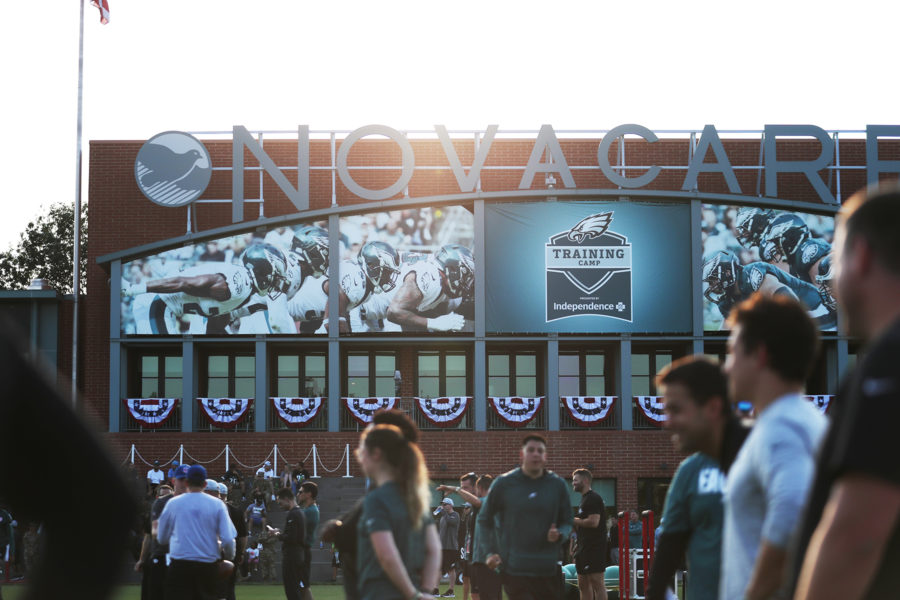
The Nova Care complex readies for the Eagles
Although plenty of Eagles fans remember taking the drive to Bethlehem to watch their favorite team prepare for the season at Lehigh University, heading to West Chester University before that and even showing up for practices at Widener, Jon Ferrari is past that.
The team’s VP of Football Operations and Compliance started with the Birds in 2016, three seasons after the franchise moved its pre-season operations in-house, to the NovaCare Complex. Over the past nine seasons, the Eagles have joined the vast majority of NFL teams that holds camp at the same site where it practices during the season. In fact, only four teams (Carolina, Dallas, Kansas City and the Rams) continue to pack up and move elsewhere in order to prepare.
“We’re embedded here,” Ferrari says. “The idea of going to Lehigh is a distant memory. We are dialed into the NovaCare Center. It’s a benefit from a facility and work standpoint. The coaches and personnel can work out of their offices. We know the technology and how to set up the players so they can use it. The players meet in their meeting rooms, and the coaches and staff can get together in their offices.”
The familiarity works in favor of the Eagles, but that doesn’t mean there isn’t a substantial amount of work necessary to make sure the team is able to work efficiently and effectively during the hot summer days. Thanks to people like Ferrari and Ryan Hummel, the VP of Facilities Operations, the team succeeds, and by the time the Eagles open a season, they have accomplished pretty much everything they must do to prepare—or at least nobody can blame the various departments that work together to produce a smooth camp for on-field problems that occur during the 17 games.
“When you work in football operations, you do it because you love the game, but you also love solving complex problems,” Ferrari says. “Is it stressful? Yes. And the fact that it’s hot adds to it.”
This is no small undertaking. During the course of training camp, 90 players, two dozen coaches and countless trainers, equipment managers, grounds crew workers and other personnel—along with sponsors and select fans lucky enough to watch some of the practices—come together in a two-week frenzy designed to set the Eagles up for success. And planning for it begins as soon as the previous season is over.
For the first 80 years of its existence, the franchise never held camp at its in-season practice site. The Eagles used universities—West Chester, Widener, Saint Joseph’s, Lehigh, Albright, Temple—high schools and various other facilities. They prepared in New Jersey, New York, Wisconsin and Minnesota. The nomadic life came to an end in 2013, and there is little reason to think anything will change in the future.
“It makes sense, with the facilities we have in Philadelphia and the access to the great playing fields at NovaCare, thanks to [VP of Grounds] Tony Leonard,” Hummel says. “It’s a good idea.”
When Ferrari discusses what goes into the equipment portion of training camp, he references the large number of interns that must take care of everything that goes into outfitting 90 players for a single practice.
“More players, more needs,” he says. “Every day in camp, we have a full-speed practice and a walk-through. Players need different shoes for each and different equipment.
“Interns have to get the balls prepped for the quarterbacks, make sure the jerseys are cleaned properly and the shoulder pads are dried properly. With 90 players and long days, there is a big strain on everything, especially equipment.”
There are more jerseys, shoes, pads and helmets. The team has to squeeze in temporary lockers. There’s more food. More hydration. More everything.
Hummel reports that after every practice, Leonard and his staff have to tend to the fields, so they will be ready for the next workout. The turf has already been brought to an optimal state before camp starts, with Leonard and his staff working during the “dead period” between OTAs [Organized Team Activities] and the start of camp to rehabilitate the NovaCare fields, and provided there is enough rain throughout the spring and early summer, it can stay in that state.
Another large component of the training camp experience is housing. When the Eagles prepared for the season at a college, players lived in dorms, which meant highly-paid professionals were sharing accommodations more suited for 18-year-old freshmen. The Birds still bring everybody together, but this time it’s at a local hotel, which must have sufficient room to handle all of the players, along with coaches and staff, trainers, video coordinators and other team employees.
“Everybody will be together for a certain amount of time,” Ferrari says. “When we break camp, people are allowed to leave the hotel and go to their permanent residences, or if they don’t have them, hotel options are available.”
The centrally-located living quarters allow for players to eat together, which handles nutritional needs. There is also a hospitality suite that offers hydration and snacks. Before the camp begins, the Eagles work with local law enforcement to make sure overzealous fans won’t be able to gain access to the hotel and “connect” with their favorite players.
Ferrari and his staff must also prepare for the Eagles’ trips to other cities when they will stage multi-day practices with other teams. This year, the Birds visit Cleveland and Miami, and that means a collection of preparations that includes finding hotels, making sure that the entire football operation—strength and conditioning, training, equipment, video, personnel, etc.—works with Travel Director Dan Ryan to execute the move. Arrangements must be made for food, travel from the hotel to the practice site, the locker room and anything else necessary to assure peak performance.
“The goal is to make sure everyone is on the same page so that we can move efficiently and maximize the days of practice that we have,” Ferrari says.
“We want it to be as seamless as possible. We don’t want the players to feel any of the behind-the-scenes work. We want them to get up, eat, watch video and get to the field and play.”
Paying attention to fields in other cities is important, but the Eagles also must make sure the turf at their home stadium is ready for action, and that isn’t just as easy as watering the grass. For instance, this summer there are four significant concerts at the Linc, and there was also the Monster Jam in April, featuring giant trucks of all kinds cavorting in large piles of dirt. Although the staff puts protective flooring over the field, it takes a lot of work to make sure conditions are optimal for practice and pre-season play.
Each year, the Birds host a pre-season game or two but also stage a public practice that can draw more than 30,000 people. Although the workout is something of an exhibition, it is imperative the players don’t get injured, and a big way to help prevent that is by making sure the playing surface is in top condition.
“It’s a little different than in the fall and winter when we don’t have concerts to contend with,” Hummel says.
The NovaCare Complex can’t accommodate the big crowds that used to fill the stands at Lehigh, but there are a few hundred fans, sponsors and guests at practice each day, and that means Hummel and his staff must create an area to host them. That includes “500 feet of tents,” outdoor restrooms and hospitality areas to maximize the fan experience.
As summer heads toward the season opener, the number of players participating in drills drops, and stress on facilities, fields and staff drops. There is still plenty to do, but there is a significant difference between the needs of 90 players and 53—plus practice squad members. Once training camp ends, the weekly rhythm of practices and games takes over.
“Coach [Nick] Sirianni and [GM Howie Roseman] do a good job of reminding us why we are doing this,” Ferrari says. “It’s to build a winner. We are always doing this to get ready for the season.”

